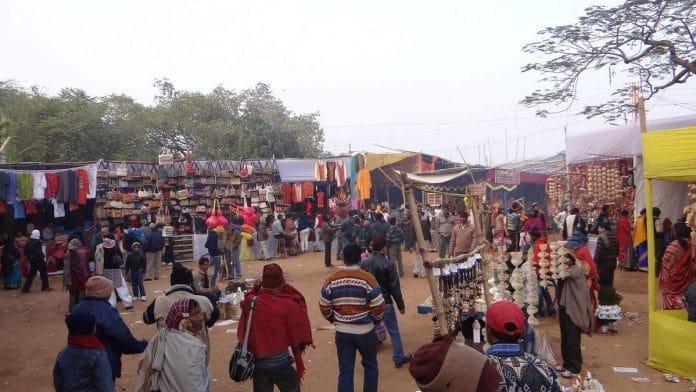Kolkata: Bengal’s famed Poush Mela, an annual affair at the Visva-Bharati University that draws culture enthusiasts from across the world every December, won’t take place this year. And the reason is not the Covid-19 pandemic.
In a break from a 125-year tradition, the Executive Council (EC), the highest decision making body of Visva-Bharati, decided to scrap the event altogether with Vice-Chancellor Prof. Bidyut Chakrabarty claiming that the university was “ill-equipped” to handle such an event.
In a note addressing “colleagues, students and other stakeholders”, dated 4 July, Chakrabarty called the festival “nightmarish”, as “the campus of Visva-Bharati is inaccessible to those who serve the university throughout the year”.
In his missive, uploaded on the university website, Chakrabarty also said the university authority was a “silent spectator” to the event, but was made to pay for all the expenses, which was “shocking”. He also alleged that some “specific groups” gain “monetary benefit” from the Poush Mela.
The university was also pulled up by the National Green Tribunal for flouting environmental rules and guidelines in 2017.
Also read: Rabindranath Tagore — the poet who knew nationalism could not rise above humanity
‘Unilateral decision’
The decision to scrap the event has left many shocked in Bengal, with the Shantiniketan Trust, the custodian of the Poush Mela, saying it was not even consulted.
Anil Konar, honorary secretary of the trust, told ThePrint: “The EC, headed by the V-C of the university, has taken a unilateral decision on cancelling the event. The trust members were not consulted.”
He added, “The event has historical and traditional significance that attracts people globally. It used to be an event for students who live across the country and abroad to see their alma mater. This is harsh on students and other stakeholders.”
The Poush Mela, Konar said, was first organised in 1894, and is considered a signature of Bengal’s tradition, a legacy of Rabindranath Tagore that has over the years also given a platform to tribal villagers from the area to showcase their art and artefacts, besides proving important for the local economy.
Tagore’s father Maharshi Debendranath Tagore had bought 20 bighas of land at Bolpur (then a village) in 1862, and built Shantiniketan. In 1888, he signed the Shantiniketan Trust deed and made the trust a custodian, Konar said.
However, V-C Chakrabarty said in his missive: “Two signature events of Visva-Bharati happen to be a) the Poush Mela and Poush Utsab, and b) Basanta Utsab… and when they take place, the campus of Visva-Bharati is inaccessible to those who serve the university throughout the year. For those who live in the vicinity of the grounds where Poush Mela and Basanta Utsab are held, these events are nothing short of nightmarish.”
He added, “As per the Shantiniketan Trust Deed which Gurudev’s father, Maharshi Debendranath Tagore, prepared, the Shantiniketan Trust is the true custodian of the mela, but gradually the Mela unofficially became the Visva-Bharati’s responsibility to hold for which the university was woefully unequipped. As a result, a specific group with the university was vetted of organising the Mela, and in the pre-2019 years, the university authority remained, in general, a mute observer, though the ultimate responsibility rested with the university.”
Chakrabarty also wrote, “Neither the university nor the Trust seems to have been involved intimately, as the old record demonstrates.”
Also read: Rabindranath Tagore was also Bhanusingha, inspired by a ‘Vaishnav saint’ and a British poet
NGT rap and traders’ abuse
V-C Chakrabarty went on to explain how the university authorities put in a lot of effort to comply with the NGT rules and guidelines to keep the mela afloat.
The NGT case is still pending, with the next hearing set for 17 July, said a member of the Shantiniketan Trust. In its previous order, the NGT had asked the university to bring down the duration of the mela to four days from over a week.
The V-C was also summoned to the Prime Minister’s Office last year (Narendra Modi is the chancellor of the university) and said “all necessary actions were taken to maintain the pollution guidelines”.
However, Chakrabarty said things fell flat last year as the traders’ body that puts up stalls at the mela refused to abide by the rules, and abused and attacked the authorities, following which cases were lodged with the Birbhum district police.
‘Culture shock’
Noted academician Pabitra Sarkar called the Visva-Bharati V-C’s decision a “culture shock” to Bengalis in the state and outside.
“Poush Mela cannot be equated with a general fair. It has been a source of nostalgia for many, and a connection to Tagore for others. It attracts thousands and lakhs of people. The local economy revolves around this fair. Tagore started the mela to make the tribal villagers earn and showcase their craft. It has been a multi-dimensional event,” Sarkar said.
Meanwhile, Bolpur MP Asit Kumar Mal of the Trinamool Congress said while he was not invited to the meeting and not consulted about the decision, he wouldn’t like to interfere with the Visva-Bharati Executive Council’s decision.
“Many major events are facing a shutdown across the world. Here is one more. I would not like to interfere in the internal decisions of the university authority,” Mal said.
Also read: Dear proud Bengali, Tagore and Satyajit Ray are past. Please come out of the time trap







While it’s a very sad piece of news, the VC’ s contention needs to be listened to. If the traders and other people who set up stalls or shops in the mela refuse to follow NGT directives, and become aggressive when efforts are made to convince them to comply, and further, the VC has to answer for that to the prime minister,it is not fair. Talking of Tagore, and getting emotional is just not good enough. If local economy is so dependent on the mela, then the stakeholders must behave more responsibly.